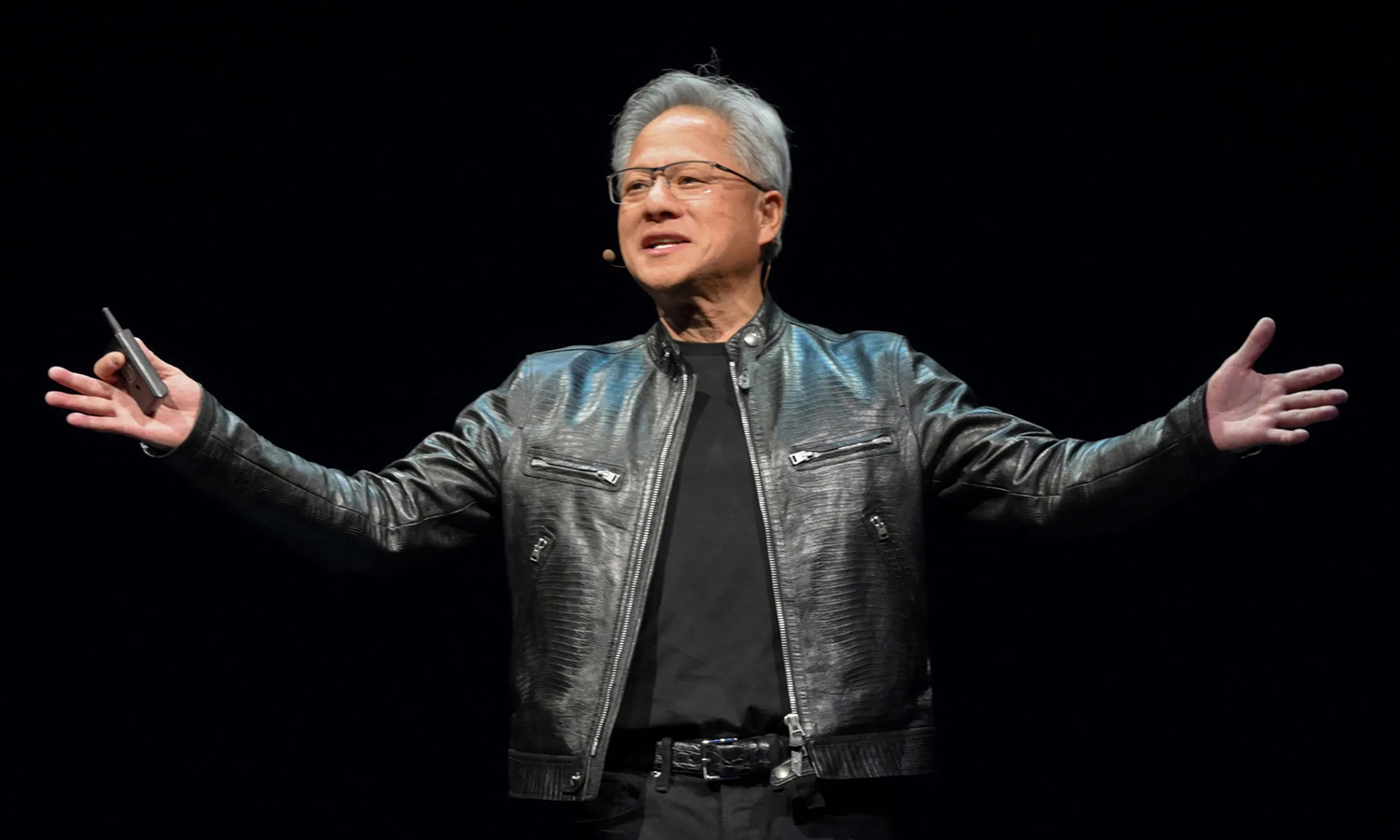
英偉達首席執(zhí)行官不會放棄你,乍聽之下這似乎很不錯。不過,英偉達的員工似乎已經(jīng)陷入了困境,他們夜以繼日地工作,只是因為高管聲稱對他們有多么信任。
由于旗下的人工智能芯片設計公司在6月份的估值飆升至3萬億美元,英偉達首席執(zhí)行官黃仁勛最近在科技界成為巨擘。然而,他并沒有帶來一種不同的工作方式:在與Stripe首席執(zhí)行官帕特里克·克里森(Patrick Collison)的一次爐邊談話中,黃仁勛稱贊了將員工逼到絕境的價值。
“我相信你的實力,所以我寧愿折磨你成才。”黃仁勛說。雖然他表示自己是“半開玩笑的”,但補充道:“我認為真正相信自己團隊的教練才會折磨他們,讓他們變得偉大。”
黃仁勛說,當你解雇某人時,人們通常認為該員工無法勝任手頭的工作,但他并不認同這種想法。他說:“我不喜歡放棄別人,因為我覺得他們可以取得進步。”
黃仁勛與其說是避免把所有雞蛋都放在同一個籃子里,不如說是更想讓員工突破極限。事實上,最近出現(xiàn)了有關英偉達殘酷的工作環(huán)境的報道。據(jù)彭博社報道,10位現(xiàn)任和前任員工的匿名采訪描繪了一幅永遠在線的企業(yè)文化圖景。
其中一位前員工談到了七天工作制和每天凌晨一兩點下班的情況。他們指出,其他工作人員甚至會工作到更晚才打卡下班。據(jù)報道,這種“劍拔弩張的形勢”導致辦公室氣氛緊張。另一名前員工說,她每天要參加7到10次會議,在這些會議上,大喊大叫和大打出手是常有的事。
這種工作狂的風氣或許是從上而下形成的。在同一場爐邊談話中,當被問及工作與生活的平衡問題時,黃仁勛說了下面這段話:“實現(xiàn)工作與生活的平衡非常棒,但我盡自己所能地工作。”他還補充說,他從一醒來就開始工作,一直工作到上床睡覺,而且總是想著工作,不要問他最喜歡最近看過的電影的哪些情節(jié),因為他雖然坐在那里,“但由于在想工作,所以不記得電影內(nèi)容了”。
這最終導致了一個類似于在晴空萬里的好天氣里被困在室內(nèi)沒有任何休息的情況。在薪酬方面,英偉達公司的員工的待遇相當優(yōu)厚,員工最多可以拿出工資的15%,以15%的折扣購買公司股票。但由于工作時間過長,他們并沒有多少活動場所去享受財富帶來的樂趣。
一位前雇員形容這就像被“金手銬”銬住了一樣,她解釋說,因為這樣的財富積累機會,她兩年都沒有離職。毋庸置疑,許多員工之所以不辭職,很可能是因為他們的既得股份和每四年一次的潛在股票授予歸屬機會。根據(jù)英偉達2024財年的“可持續(xù)發(fā)展報告”,2023年,該公司的離職率為2.7%,而半導體行業(yè)的整體離職率為17.7%。
黃仁勛的信條之一是,他希望所有員工都能發(fā)揮自己應有的潛力。他指出:“這二者的關系通常很緊密,你能想象自己在取得成功之前的那一刻放棄了嗎?我不想讓你放棄,所以我會一直折磨你。”
英偉達拒絕了《財富》雜志的置評請求。(財富中文網(wǎng))
譯者:中慧言-王芳
英偉達首席執(zhí)行官不會放棄你,乍聽之下這似乎很不錯。不過,英偉達的員工似乎已經(jīng)陷入了困境,他們夜以繼日地工作,只是因為高管聲稱對他們有多么信任。
由于旗下的人工智能芯片設計公司在6月份的估值飆升至3萬億美元,英偉達首席執(zhí)行官黃仁勛最近在科技界成為巨擘。然而,他并沒有帶來一種不同的工作方式:在與Stripe首席執(zhí)行官帕特里克·克里森(Patrick Collison)的一次爐邊談話中,黃仁勛稱贊了將員工逼到絕境的價值。
“我相信你的實力,所以我寧愿折磨你成才。”黃仁勛說。雖然他表示自己是“半開玩笑的”,但補充道:“我認為真正相信自己團隊的教練才會折磨他們,讓他們變得偉大。”
黃仁勛說,當你解雇某人時,人們通常認為該員工無法勝任手頭的工作,但他并不認同這種想法。他說:“我不喜歡放棄別人,因為我覺得他們可以取得進步。”
黃仁勛與其說是避免把所有雞蛋都放在同一個籃子里,不如說是更想讓員工突破極限。事實上,最近出現(xiàn)了有關英偉達殘酷的工作環(huán)境的報道。據(jù)彭博社報道,10位現(xiàn)任和前任員工的匿名采訪描繪了一幅永遠在線的企業(yè)文化圖景。
其中一位前員工談到了七天工作制和每天凌晨一兩點下班的情況。他們指出,其他工作人員甚至會工作到更晚才打卡下班。據(jù)報道,這種“劍拔弩張的形勢”導致辦公室氣氛緊張。另一名前員工說,她每天要參加7到10次會議,在這些會議上,大喊大叫和大打出手是常有的事。
這種工作狂的風氣或許是從上而下形成的。在同一場爐邊談話中,當被問及工作與生活的平衡問題時,黃仁勛說了下面這段話:“實現(xiàn)工作與生活的平衡非常棒,但我盡自己所能地工作。”他還補充說,他從一醒來就開始工作,一直工作到上床睡覺,而且總是想著工作,不要問他最喜歡最近看過的電影的哪些情節(jié),因為他雖然坐在那里,“但由于在想工作,所以不記得電影內(nèi)容了”。
這最終導致了一個類似于在晴空萬里的好天氣里被困在室內(nèi)沒有任何休息的情況。在薪酬方面,英偉達公司的員工的待遇相當優(yōu)厚,員工最多可以拿出工資的15%,以15%的折扣購買公司股票。但由于工作時間過長,他們并沒有多少活動場所去享受財富帶來的樂趣。
一位前雇員形容這就像被“金手銬”銬住了一樣,她解釋說,因為這樣的財富積累機會,她兩年都沒有離職。毋庸置疑,許多員工之所以不辭職,很可能是因為他們的既得股份和每四年一次的潛在股票授予歸屬機會。根據(jù)英偉達2024財年的“可持續(xù)發(fā)展報告”,2023年,該公司的離職率為2.7%,而半導體行業(yè)的整體離職率為17.7%。
黃仁勛的信條之一是,他希望所有員工都能發(fā)揮自己應有的潛力。他指出:“這二者的關系通常很緊密,你能想象自己在取得成功之前的那一刻放棄了嗎?我不想讓你放棄,所以我會一直折磨你。”
英偉達拒絕了《財富》雜志的置評請求。(財富中文網(wǎng))
譯者:中慧言-王芳
Nvidia’s CEO won’t give up on you, which at first might sound nice. But the other foot has seemingly dropped on Nvidia’s employees who are working round the clock because of just how much their executive claims to believe in them.
Huang, the CEO of Nvidia, has recently become a giant in the tech world as his AI chip design company soared to a $3 trillion valuation in June. He doesn’t necessarily usher in a different way of working, though: In a fireside chat with Stripe CEO Patrick Collison, Huang praised the value of pushing employees to the brink.
“I’d rather torture you into greatness because I believe in you,” Huang said. While he said he was being “tongue-in-cheek,” he added, “I think coaches that really believe in their team torture them into greatness.”
When you fire someone, there’s the notion that they can’t learn the job at hand, explained Huang—but he doesn’t really subscribe to that mentality. “I don’t like giving up on people because I think they could improve,” he said.
Rather than avoiding putting all his eggs in one basket, Huang strays closer to breaking them. Indeed, accounts of a grueling workplace at Nvidia have recently cropped up. Anonymous interviews from a group of 10 current and former staff members paint a picture of an always-on culture, per Bloomberg.
One such former employee spoke of seven-day workweeks and days that end around 1 or 2 a.m. They noted other staff members would sign off at even later hours. The reported “pressure cooker” has led to some tension at the office. Another former worker said she attended seven to 10 daily meetings, where fighting and shouting were common.
This workaholic norm is perhaps coming from the top down. When asked in the same fireside talk about his work-life balance, Huang said the following: “It’s really great. I work as much as I can,” adding that he works from the moment he wakes up until he goes to bed. Huang is always thinking about work, and don’t ask him how he liked the most recent film he watched, because while he might sit there he doesn’t “remember them because I’m thinking about work.”
It all leads to a situation not unlike being inside with no recess on an exceptionally nice day. Nvidia workers have a pretty sweet deal when it comes to compensation, as they can contribute up to 15% of their salary to buying company shares at a 15% discount. But because of their long hours, there’s not much of a playground to enjoy their riches with.
One former employee described it as being like being tied to “golden handcuffs,” explaining that she didn’t leave for two years because of her wealth-building opportunities. For sure, many workers likely don’t quit because of their vested shares and the potential stock grants vested every four years. Turnover sat at 2.7% in 2023 compared to the general rate of 17.7% in the semiconductor industry, according to Nvidia’s Sustainability Report for 2024’s fiscal year.
Part of Huang’s asserted ethos is that he doesn’t want his workers to miss out on their potential. “Oftentimes they’re so close,” he noted. “Could you imagine you gave up just that moment right before you got it? I don’t want you to give up on that, so I’ll just keep torturing you.”
Nvidia declined Fortune‘s request for comment.






